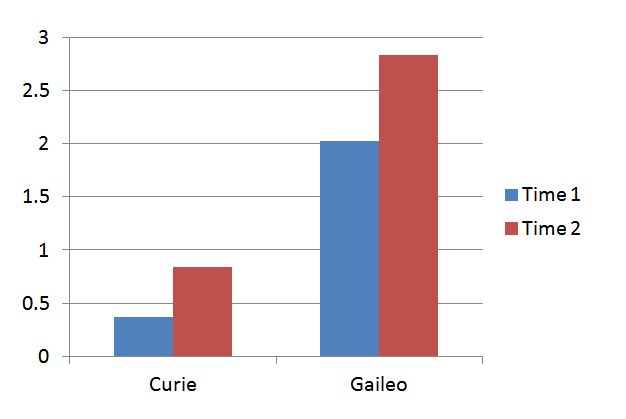The experiment tested 209 7th and 8th grade students in the U.S. on texts about the discoveries of Galileo OR the discoveries of Marie Curie. The texts were developed to be as similar as possible in terms of syntactic complexity, vocabulary, accuracy, and other measures, and vary only in whether the information was presented in a typical expository fashion or in terms of a personal story of the scientist.
For example, one section of the expository text included this passage
And with this simple, powerful tool [Galilean telescope], we can see
many details when we use it to look up into the night sky. The moon
may look like a smooth ball of light covered with dark spots, but on
a closer look through this telescope, we can see deep valleys and great
mountain ranges. Through the telescope, we can now see all the
different marks on the moon’s surface
When Galileo looked through his new telescope, he could see the
surface of the moon, and so he began his first close look into space.
He slept during the day in order to work and see the moon at night.
Many people thought that the moon was a smooth ball with a light of
its own. Now that Galileo had a closer look through his telescope, he
realized that the moon’s surface had mountains and valleys.
There's a case to be made that it also lends itself to a triumphalist view of science that is not accurate; scientists as heroes in an ever-progressing march towards Truth. Since Kuhn, that more or less Popperian view of science has been viewed as at least too simple, and more likely inaccurate.
But if it helps middle schoolers understand science, I'm inclined not worry too much about that point.
Instead, I'd like to broaden the view of "narrative." (I made this point in Why Don't Students Like School.) You don't have to think of narrative just as the story of an individual or group of people; you can think more abstractly conflict, complications, and the eventual resolution of conflict as the core of narrative structure.
I prefer to think of narrative in this broader sense because it is more flexible, and gives teachers more options, and also better captures the aspects of narrative structure that I suspect are behind the advantage conferred.
Reference
Arya, D. J. & Maul, A. (2012). The role of the scientific discovery narrative in middle school science education: An experimental study. Journal of Educational Psychology, 104, 1022-1032.

 RSS Feed
RSS Feed